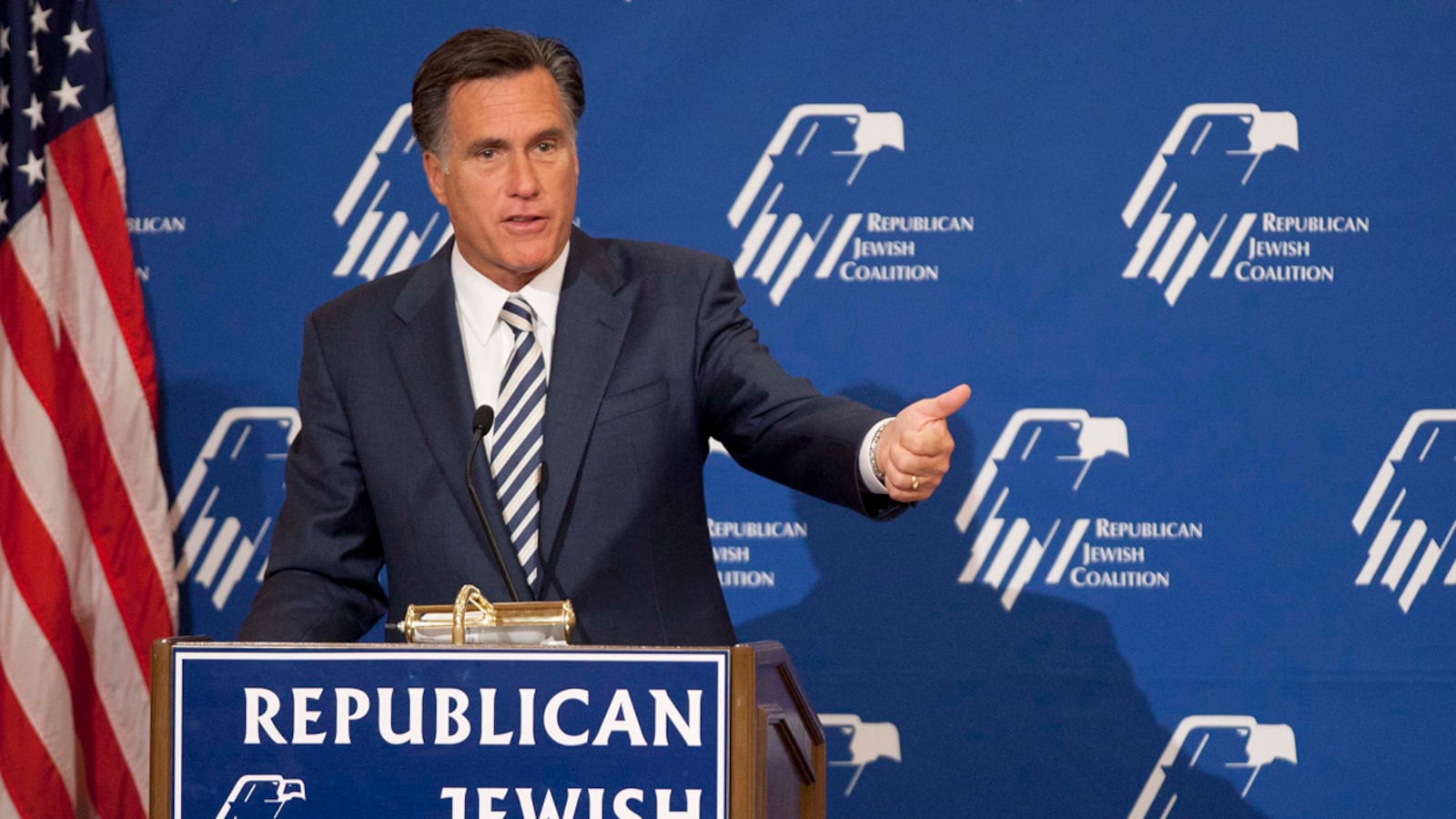Mitt Romney’s Mormon faith, so often described as an impediment to his political prospects, might work to his advantage with one crucial segment of the electorate: Jewish voters.

The very fact that his Mormonism makes him less popular among evangelical Christians almost certainly makes him more popular among American Jews. Academic analysis of the intersection of religion and politics suggests that Jews maintain a distinctly—and surprisingly—favorable view of the Church of Jesus Christ of Latter-day Saints.
This doesn’t mean Romney stands a chance of winning an outright majority in the Jewish community: no Republican presidential nominee has achieved that feat since William Howard Taft in 1908. Moreover, recent surveys indicate that most Jewish voters back Barack Obama for reelection, though his level of support has declined. Exit polls in 2008 showed Obama carrying 78 percent of Jewish votes, while a new poll by the Public Religion Research Institute (Jewish Values Survey, March 2012) shows that number falling to 62 percent if the election were held today.
Among the 30 percent of Jewish voters who say they plan to vote Republican, Romney emerges as the big winner, crushing Rick Santorum by a margin of 57 to 17 percent. When comparing these figures with the exit polls from major primaries, Romney fares much better among Republican Jews than he does among any other religious group in the GOP, except for his fellow Mormons, of course.
This outcome reflects a surprising study by two prominent professors, Robert D. Putnam of Harvard and David E. Campbell of Notre Dame, concerning public attitudes toward various faith communities. As expected, Mormons scored poorly in terms of their overall popularity, ranking below evangelical Christians, Catholics, and Jews, and ahead of only atheists and Muslims.
Among Jews, on the other hand, Mormons ranked at the very top of the approval list—and Jews viewed Mormons more warmly than did any other respondents in the survey. For those who speculate that this positive attitude might connect with the fervent support for Israel by members of the LDS church, Putnam and Campbell point out that evangelical Christians similarly love Israel, but American Jews in no way love them back. Indeed, in their study, Jewish participants gave evangelicals an even lower rating than they gave to Muslims. For those who like to think of Jews as savvy and insightful about our self-interest, it’s tough to explain why we offer less approval to a faith community that overwhelmingly wants to support us than we do to a religious tradition that has spawned tens of millions of angry adherents who say openly that they want to kill us.
Concerning Mormons, Campbell and Putnam wrote in The Wall Street Journal: “We suspect that Jews’ warmth toward Mormons stems from solidarity with another group that is small and subject to intolerance. Jews and Mormons are the two American groups most likely to report that other people disparage their religious beliefs.” If this analysis accurately describes Jewish sentiments, then every time some born-again clergyman attacks Romney for his Mormon faith or describes the LDS church as a “cult,” Jews probably look at Mitt more favorably, especially given the irrational, unjustified—but undeniable—Jewish hostility to evangelicals.
There’s also a special historical affinity between Jews and Mormons that may play a role in Romney’s relative popularity in the Jewish community. Joseph Smith, the prophet and founder of the LDS church, qualified as a committed “restorationist”—eager to facilitate the return of the Jews to their ancient homeland. In his fascinating book Power, Faith, and Fantasy [http://www.amazon.com/exec/obidos/ASIN/B00509CS7O/thedaibea-20]], Michael B. Oren, who is Israel’s ambassador to the U.S., writes of the first Mormon pilgrimage to Jerusalem. In 1841, Smith sent his “personal apostle” Orson Hyde to the ancient Jewish capital. “Climbing the Mount of Olives, Hyde erected an altar and beseeched God to ‘restore the kingdom unto Israel—raise up Jerusalem as its capital, and continue her people a distinct nation and government.’ Mormons would later integrate that prayer into their liturgy and, on the site of Hyde’s altar, build a branch of Brigham Young University.”
That handsome and impressive facility has become a well-regarded fixture in the life of modern Jerusalem, overcoming resistance from many Orthodox Jewish leaders at the time of its construction in the early 1980s. According to nearly all accounts, the Mormons have carefully kept their promise to avoid using the BYU center as a base for missionary activity, and this “good neighbor” policy has greatly enhanced their popularity in Israel. My late father, who chose to spend the last 20 years of his life in Jerusalem, regularly attended the outstanding series of classical-music concerts graciously hosted at the Mormon campus on Sundays.
Back in the United States, Mormons and Jews frequently laugh together at our common use of the word “gentiles” to describe the multitudes outside our minority religious communities. The first “gentile” governor of the state of Utah was, indeed, Jewish: Simon Bamberger served between 1917 and 1921.
Mitt Romney’s business career brought him into close collaboration with Jewish communal leaders in Massachusetts and around the country. As a young graduate of Harvard Business School, he took his first full-time job at the Boston Consulting Group, where he worked alongside a young graduate of the MIT Business School, Benjamin Netanyahu, who later went on to win a more prominent job as Israel’s prime minister. Romney, naturally, likes to tell that story on the campaign trail. Last year, he offered his prestige and contacts to a fundraising banquet (where, in the interests of full disclosure, I was also a featured speaker) for the Jerusalem College of Technology, a dynamic institution that combines Orthodox religious study with world-class training in engineering.
Of course, most evangelical leaders similarly show their love for the Jewish people by backing Israeli institutions, leading tours of the Holy Land, and even defending our religious liberties when they’re threatened in the United States. When aggressive efforts to ban all infant circumcisions were undertaken last year in San Francisco and Santa Monica, evangelical Christians provided crucial backing to turn back the assault on our right to our rite.
But the prominent, powerful involvement of evangelicals in conservative politics alarms many in the Jewish community, which remains overwhelmingly liberal; 64 percent of Jews describe themselves as Democrats. Since most Jews also count as decidedly irreligious, shunning synagogue or temple membership and avoiding traditional patterns of observance, the chief sense in which they see themselves as distinctively Jewish involves their rejection of the core claims of Christianity. This means secular, liberal Jewish voters react with particular horror to any mixture of Christianity and politics. John Marttila, a pollster for the Anti-Defamation League, told the Jerusalem Post that “he believed that the rhetoric of the Republican primaries, particularly on religious issues, was alienating moderate Jews who might otherwise consider voting for the GOP.”
Romney has been a victim of that rhetoric far more than the source of it; he recognizes the lingering doubts about his own faith and has tried for the most part to avoid combining preaching and politics. This may not build his popularity among evangelical voters in the upcoming primaries in Pennsylvania or Texas, but it makes him far more viable in the Jewish community than his remaining Republican rivals.






